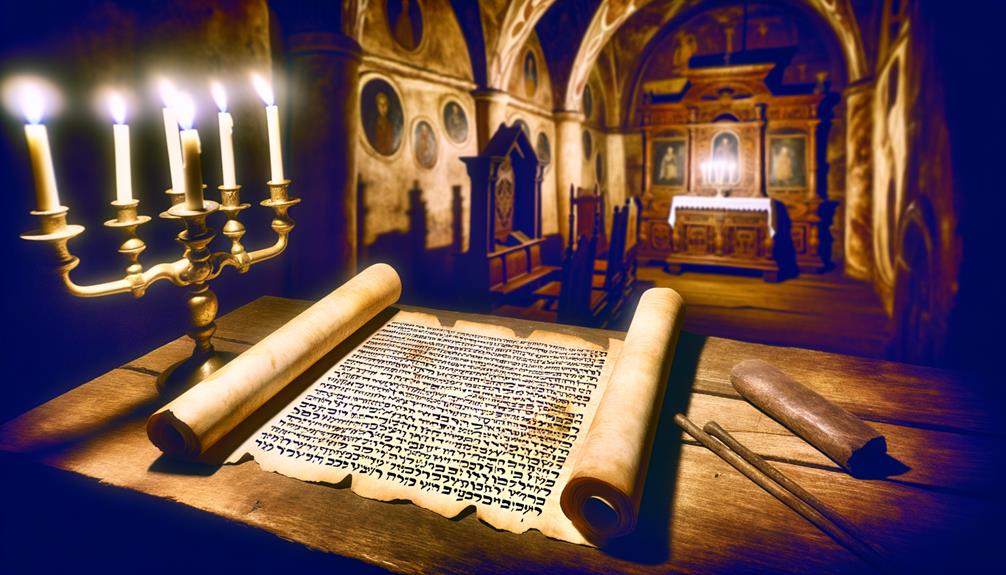Meaning of Bryson in the Bible: Name Interpretation
The name Bryson, although not directly mentioned in the Bible, derives from the Old English ‘Bryce,’ meaning ‘son of Bryce,’ with a noted Celtic influence. It connotes strength and nobility, aligning with biblical themes of lineage and divine heritage.
Historically connected to Saint Brice of Tours, a figure of transformation and ecclesiastical reform, Bryson underlines the significance of ancestry and spiritual resilience. The linguistic and cultural roots of the name offer a rich tapestry of historical and symbolic interpretations, providing deeper theological and spiritual insights for those exploring its profound significance further.

Meaning of Bryson in the Bible: Name Origin and Spiritual Reflection
| Aspect | Details |
|---|---|
| Name | Bryson |
| Meaning | Son of Brice; strong or alert (English origin) |
| Biblical Reference | Not directly mentioned in the Bible |
| Name Origin | Derived from a surname, related to strength and nobility |
| Spiritual Symbolism | Associated with alertness, strength, and purpose |
| Faith Insight | Though not a biblical name, Bryson reflects qualities like watchfulness and spiritual strength |
Origins of the Name Bryson

Although the name Bryson is not directly of biblical origin, its etymology can be traced back to Old English and Celtic roots, offering a rich linguistic and cultural history worthy of scholarly examination.
The name Bryson is derived from the Old English term ‘Bryce,’ meaning ‘son of Bryce.’ The Celtic influence is evident in the name’s structure and phonetic qualities, which bear similarities to Gaelic naming conventions.
Additionally, the prefix ‘Bry-‘ can also be linked to the Celtic word ‘brigh,’ translating to ‘strength’ or ‘nobility.’ This dual linguistic lineage enriches the name Bryson, embedding it with multiple layers of historical and cultural significance.
Understanding these origins provides a nuanced perspective on its contemporary usage and resonance.
Patronymic Significance

The patronymic significance of the name Bryson lies in its function as a surname derived from a given name, specifically indicating lineage or descent from an ancestor named Bryce.
This etymological structure, common in various cultures, signifies the importance of ancestral heritage.
With respect to biblical context, the use of patronymics underscores the significance of familial lineage, often seen in genealogical records.
| Aspect | Explanation | Example |
|---|---|---|
| Etymology | Derived from ‘Bryce’ | Bryson = Son of Bryce |
| Cultural Context | Emphasizes family heritage | Biblical genealogies |
| Biblical Usage | Traces lineage and inheritance | Genealogical records |
This naming convention not only preserves the memory of forebears but also affirms social and spiritual identities within a community.
Saint Brice of Tours

Saint Brice of Tours, a notable figure in early Christian history, provides a compelling narrative through his early life, significant ecclesiastical contributions, and enduring legacy.
His transformation from a contentious youth to a revered bishop encapsulates the potential for personal redemption and spiritual growth.
Analyzing his impact on the Christian community of Tours reveals the lasting influence of his leadership and reforms.
Early Life Details
Born in the late 4th century, Brice of Tours’ early life was marked by his adoption and tutelage under Saint Martin of Tours, which profoundly influenced his spiritual development and future ecclesiastical career.
Raised within the Christian faith, Brice exhibited both promise and challenges, often described as impetuous in his youth. Saint Martin’s guidance was essential in channeling Brice’s fervor towards a disciplined clerical path.
The relationship between mentor and pupil was foundational, setting the stage for Brice’s later achievements and struggles within the Church.
| Aspect | Details | Impact |
|---|---|---|
| Adoption | By Saint Martin of Tours | Spiritual and moral guidance |
| Early Education | Christian doctrines | Formative religious influence |
| Personality | Impetuous | Required strict mentorship |
| Ecclesiastical Role | Early clerical training | Foundation for future career |
Key Contributions Highlighted
Building upon the foundational mentorship of Saint Martin, Brice of Tours’ key contributions to the Church exhibit a complex interplay of his fervent spiritual devotion and administrative acumen.
His tenure as Bishop of Tours was marked by significant ecclesiastical and civic advancements:
- Restoration of Ecclesiastical Discipline: Brice emphasized the importance of clerical discipline, instituting reforms that strengthened the moral and ethical framework of the clergy.
- Charitable Initiatives: He expanded the Church’s charitable activities, establishing institutions to care for the poor and marginalized.
- Architectural Developments: Under Brice’s guidance, numerous church structures were constructed and refurbished, enhancing the spiritual and communal life of Tours.
These contributions collectively underscore Brice’s role in fortifying the Church’s influence and infrastructure during his episcopacy.
Legacy and Influence
The enduring legacy of Brice of Tours is encapsulated in his transformative impact on ecclesiastical practices and community welfare, which continued to resonate long after his episcopacy.
Elevated to bishop in 397 AD, Brice’s tenure was marked by significant reforms in church administration and pastoral care. He championed the establishment of charitable institutions, ensuring aid for the impoverished and destitute within his diocese.
His commitment to social justice and ecclesiastical discipline set a precedent that influenced subsequent generations of clergy.
Despite facing controversies and exile, Brice’s resilience and dedication reinforced the moral and spiritual framework of his community, leaving an indelible mark on the ecclesiastical history of Tours and the broader Christian tradition.
Early Christian Connections

Tracing the name Bryson to early Christian contexts reveals intriguing insights into the cultural and religious interactions of the period. Examination of historical documents and early Christian writings shows that names like Bryson were often influenced by Greek and Roman traditions.
This interplay of cultures can be seen through:
- Literary Mentions: Early Christian texts occasionally reference names like Bryson, suggesting their integration into broader societal narratives.
- Cultural Syncretism: The adoption and adaptation of Greco-Roman names by early Christians highlight the fluid exchange between differing belief systems.
- Historical Records: Archaeological findings and records indicate that individuals named Bryson were part of early Christian communities, reflecting the diverse makeup of early adherents.
These points underscore the importance of understanding name origins within their historical and cultural milieu.
Symbolic Interpretations

In exploring the symbolic interpretations of the name Bryson within a biblical context, it is imperative to take into account the historical context that may have influenced its usage and significance.
Analyzing the theological implications tied to this name can provide deeper insights into its spiritual relevance.
Additionally, examining the linguistic roots of Bryson can reveal how its etymology contributes to its perceived meanings and associations in biblical texts.
Historical Context Analysis
Examining the historical context of the name Bryson within biblical literature reveals complex layers of symbolic interpretations that are essential for a thorough understanding.
This analysis uncovers how names in biblical texts often carry rich connotations that transcend their surface meanings.
Particularly, Bryson is not directly mentioned in canonical scriptures, but its etymology and cultural implications can be dissected through several lenses:
- Etymological Roots: Investigating the Greek origins of ‘Bryson’ suggests meanings related to strength and nobility.
- Cultural Contexts: Names similar to Bryson may appear in ancient texts, reflecting societal values and spiritual beliefs.
- Literary Symbolism: Names often encapsulate traits or destinies, offering insight into the character’s role within the narrative.
These layers provide a nuanced understanding critical for biblical exegesis.
Theological Significance Explored
While the name Bryson is not explicitly found within biblical texts, its potential theological significance can be discerned through symbolic interpretations of similar names and their connotations within scripture.
Names such as ‘Bryce’ and ‘Bryan,’ akin to Bryson, evoke meanings of strength and nobility. In scripture, names often reflect divine attributes or roles within God’s plan, implying that Bryson might symbolize a person endowed with resilience and leadership.
Additionally, ‘son’ connotes lineage and inheritance, hinting at theological themes of divine sonship and covenant. Consequently, Bryson can be seen as embodying virtues of steadfast faith and divine purpose, resonant with biblical themes of renewal and divine favor.
This makes it a name rich in symbolic theological significance.
Linguistic Roots Deciphered
The name Bryson, when dissected through its linguistic components, reveals roots that intertwine cultural heritage and symbolic linguistic elements, offering a deeper understanding of its potential theological implications.
The etymology of Bryson can be traced back to Old English and Celtic origins, where it combines elements that hold significant symbolic meaning.
- Bryce: Deriving from the French ‘Brice,’ meaning ‘speckled’ or ‘freckled,’ symbolizing uniqueness and individual divine creation.
- -son: A suffix denoting ‘son of,’ which can be interpreted as a metaphor for divine lineage or spiritual inheritance.
- Combined Form: When unified, Bryson can be seen as ‘son of the speckled one,’ potentially symbolizing a unique individual within the divine family.
These linguistic roots offer a nuanced perspective for theological reflection.
Modern Spiritual Relevance

In contemporary spiritual contexts, the name Bryson is often imbued with layers of meaning that resonate with both personal identity and collective cultural narratives.
This name, while not explicitly biblical, offers a canvas for modern spiritual interpretation. Derived from the Old English ‘Bricson,’ meaning ‘son of Brice,’ it evokes themes of heritage and lineage.
In a spiritual framework, Bryson can symbolize the continuity of faith and the inheritance of spiritual wisdom across generations. Additionally, it can reflect the modern individual’s journey to balance personal belief systems with communal traditions.
The name Bryson, consequently, becomes a nexus for exploring how ancient roots and contemporary spiritual practices intersect, offering a rich tapestry for understanding one’s place in the world.
Conclusion
In conclusion, the name Bryson, while not explicitly found within biblical texts, carries a rich tapestry of historical and religious connotations.
Like a mosaic, each element—its patronymic roots, association with Saint Brice of Tours, early Christian connections, and symbolic interpretations—contributes to its modern spiritual relevance.
This multifaceted legacy underscores the enduring impact of names and their capacity to bridge past and present, tradition and contemporary significance.






